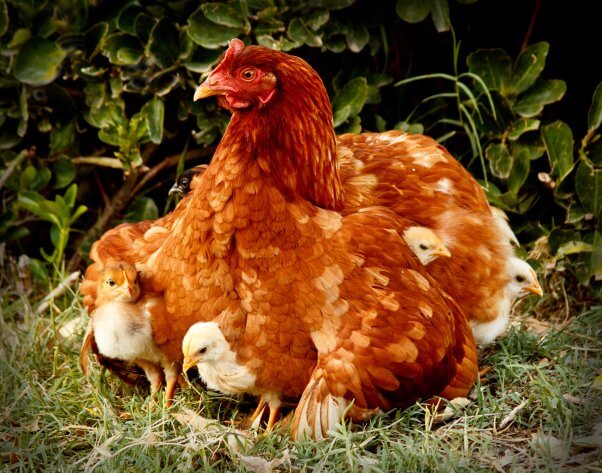PETA’s Executive Vice President Tackles Your Tough Questions

Chickens have to produce eggs, so why is it a problem for us to eat their eggs?
– Confused Consumer
![]() For starters, hens aren’t egg-laying factories who exist just so humans can take their eggs as if they were taking candy from a vending machine – but that’s how they’re treated. In fact, hens produce eggs because nature tells them it’s time for them to have chicks of their own. As PETA’s investigations into egg farms show, hens are kept in prison-like conditions. On almost every factory farm, including ones from whence “farm fresh” and “cage-free” eggs come, hens are tightly crammed onto a floor or into miserably small cages stacked in windowless sheds and are surrounded by so many other hens that they can barely move a wing. Usually, the end of their beak is sliced off to prevent them from pecking at each other out of stress. No matter how injured or sick they become (a leg broken in cage wires, respiratory illness that fills their head with snot), they’re invariably denied veterinary care, and the bodies of dead birds are often left to rot beside their living cagemates. Commercial enterprises have manipulated hens’ reproductive systems, forcing the birds to produce up to 300 eggs a year – not the 15 or so their ancestors would have laid. After just two years, their bodies give out and they’re slaughtered. Revolting, right? Try tofu scramble or oatmeal for breakfast, and silken tofu or even smushed bananas are good egg substitutes when baking. Check out PETA’s vegan baking cheat sheet for more tips.
For starters, hens aren’t egg-laying factories who exist just so humans can take their eggs as if they were taking candy from a vending machine – but that’s how they’re treated. In fact, hens produce eggs because nature tells them it’s time for them to have chicks of their own. As PETA’s investigations into egg farms show, hens are kept in prison-like conditions. On almost every factory farm, including ones from whence “farm fresh” and “cage-free” eggs come, hens are tightly crammed onto a floor or into miserably small cages stacked in windowless sheds and are surrounded by so many other hens that they can barely move a wing. Usually, the end of their beak is sliced off to prevent them from pecking at each other out of stress. No matter how injured or sick they become (a leg broken in cage wires, respiratory illness that fills their head with snot), they’re invariably denied veterinary care, and the bodies of dead birds are often left to rot beside their living cagemates. Commercial enterprises have manipulated hens’ reproductive systems, forcing the birds to produce up to 300 eggs a year – not the 15 or so their ancestors would have laid. After just two years, their bodies give out and they’re slaughtered. Revolting, right? Try tofu scramble or oatmeal for breakfast, and silken tofu or even smushed bananas are good egg substitutes when baking. Check out PETA’s vegan baking cheat sheet for more tips.


I saw a PETA billboard that said, “You Can’t Be an Egg-Eating Feminist.” What?! This woman wants her protein.
– Shell-Shocked
![]() Anyone who thinks they need eggs for protein has egg on their face. There’s more protein in a serving of chickpeas, lentils, tofu, almonds, or black beans – and unlike eggs, those aren’t cholesterol bombs. True feminists reject all exploitation of all females. And we support the right of every female not to live as a handmaiden.
Anyone who thinks they need eggs for protein has egg on their face. There’s more protein in a serving of chickpeas, lentils, tofu, almonds, or black beans – and unlike eggs, those aren’t cholesterol bombs. True feminists reject all exploitation of all females. And we support the right of every female not to live as a handmaiden.

I buy free-range, organic eggs. Why is PETA opposed to those?
– Selective Shopper
![]() Don’t buy it, literally and figuratively! Comforting labels, including “free-range,” do just that: comfort humans. For hens, they’re essentially meaningless. Despite the pricey promises, most “cage-free” or “free-range” chickens are trapped in dark, crowded, waste-filled warehouses. Ammonia burns their lungs, eyes, and skin, and they suffer from breast blisters. When the birds are given outdoor access, usually it’s a hole in a shed wall they have to fight to reach, the door’s often closed, and it only leads to a small, dirt pen. PETA UK’s exposé of a “free-range” egg farm showed sick and dying birds in a dark shed next to bird corpses. The birds aren’t slaughtered humanely, either. If you buy “humane” eggs, I have an oceanfront property in Nevada you might like.
Don’t buy it, literally and figuratively! Comforting labels, including “free-range,” do just that: comfort humans. For hens, they’re essentially meaningless. Despite the pricey promises, most “cage-free” or “free-range” chickens are trapped in dark, crowded, waste-filled warehouses. Ammonia burns their lungs, eyes, and skin, and they suffer from breast blisters. When the birds are given outdoor access, usually it’s a hole in a shed wall they have to fight to reach, the door’s often closed, and it only leads to a small, dirt pen. PETA UK’s exposé of a “free-range” egg farm showed sick and dying birds in a dark shed next to bird corpses. The birds aren’t slaughtered humanely, either. If you buy “humane” eggs, I have an oceanfront property in Nevada you might like.

Be Part of It!
Do you have a burning question for Tracy? E-mail it to [email protected].



